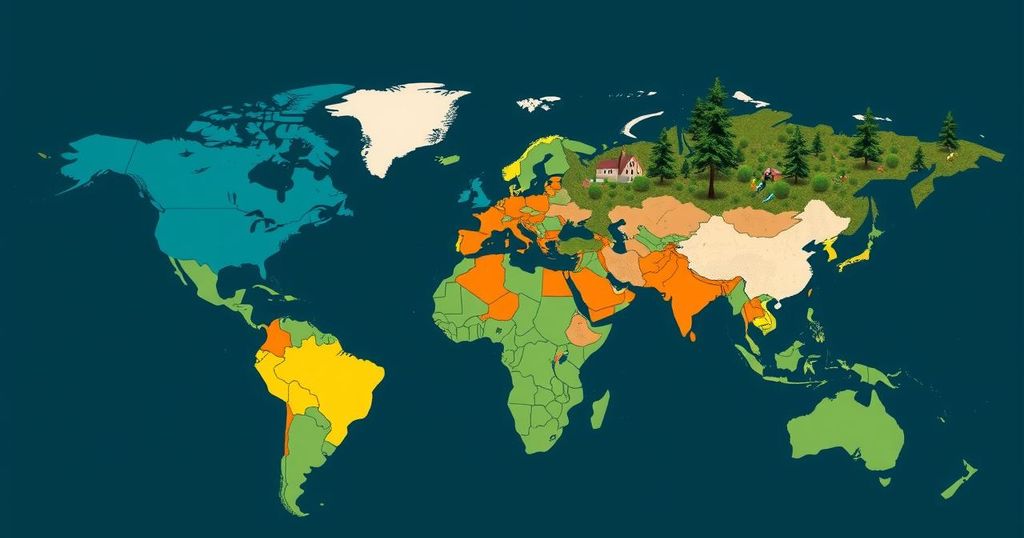Richer Countries Begin Compensating Poorer Nations for Climate Change Damages

Richer nations are implementing compensation payments to poorer ones affected by climate change disasters, like Cyclone Freddy in Malawi. The “loss and damage” initiative has seen pledges of around $720 million, yet experts warn that this may be insufficient amid worsening climate impacts. The ongoing COP29 summit is addressing how to operationalize these funds for developing nations in need, while emphasizing the underlying responsibility of wealthier countries towards climate justice and resilience efforts.
In recent years, wealthier nations have initiated compensation payments to lower-income countries significantly impacted by climate change-related disasters. A poignant case is that of Christopher Bingala, a subsistence farmer in Malawi, who lost his home and livestock during Cyclone Freddy in 2023. Fortunately, Bingala received approximately $750, which enabled him to construct a new residence for his family. This payment exemplifies the burgeoning “loss and damage” compensation initiative, which seeks to alleviate the financial burdens borne by nations disproportionately affected by climate-related consequences, despite contributing little to global emissions.
Inspired by these challenges, affluent countries have begun to pledge funds. Notably, $720 million has been promised by nations such as the European Union, the United States, and the United Arab Emirates, aiming to provide support for climate-induced damages. However, experts caution that given the escalating frequency and severity of climate disasters, these funds may be inadequate. During the ongoing COP29 climate summit in Baku, Azerbaijan, negotiations are taking place to determine the required contributions to developing countries as part of a broader climate finance framework.
The aftermath of Cyclone Freddy, which forced the displacement of 650,000 individuals in Malawi, highlights the dire need for such financial support. Bingala’s family, after enduring food shortages and temporary refuge, reinvested the received funds into their new lives, highlighting not only resilience but also the crucial role of immediate financial assistance. With the introduction of the loss and damage fund, initiated by governments like Scotland’s, this financial backing represents a vital step toward recovery for many vulnerable communities.
Nevertheless, discussions surrounding the loss and damage funding also raise critical considerations about its implementation and outcomes. Experts argue that funding should extend beyond recovery efforts to encompass broader issues such as relocation from high-risk areas and preservation of cultural heritage. As extreme weather events become more routine, the projected financial need for loss and damage funding could escalate to $250 billion annually by 2030. This alarming trend mandates a robust response from wealthier countries, as their inaction could lead to detrimental consequences for vulnerable nations and possibly, broader humanitarian crises.
Ultimately, it is imperative for affluent nations to recognize their responsibility in contributing to loss and damage funding as a matter of global justice and mutual interest. The challenge posed by climate change transcends borders, and failing to take action may inadvertently create climate refugees and exacerbate global instability.
The topic of climate change and its impacts on vulnerable populations is increasingly pressing, as low-income nations often suffer disproportionately from severe weather events despite contributing minimally to global greenhouse gas emissions. Instances such as Cyclone Freddy underscore the urgent need for a structured response to the financial repercussions of climate-related disasters. In recognition of these challenges, wealthy nations have begun formalizing compensation measures aimed at assisting affected communities to facilitate recovery and resilience in the face of climate adversities.
The development of compensation mechanisms for loss and damage related to climate change emerges as a critical response to assist low-income countries facing devastating impacts. While initial funding commitments have been made, experts express concern over the sufficiency of these funds amidst escalating climate disasters. Increased engagement and contribution from wealthier nations will be essential in addressing the mounting financial demands posed by climate change in developing regions, ensuring a more equitable global response to this looming crisis.
Original Source: www.wrvo.org






